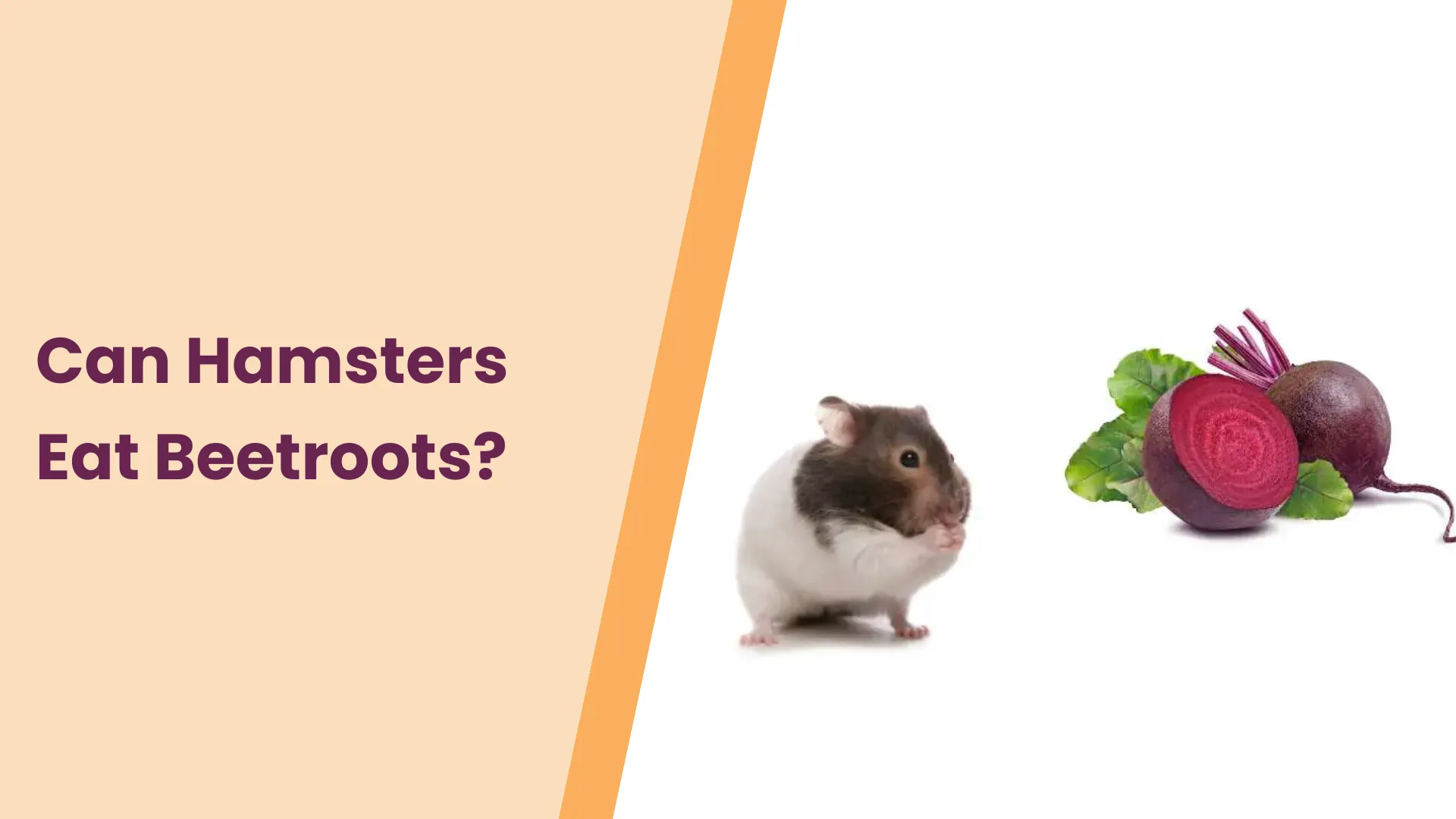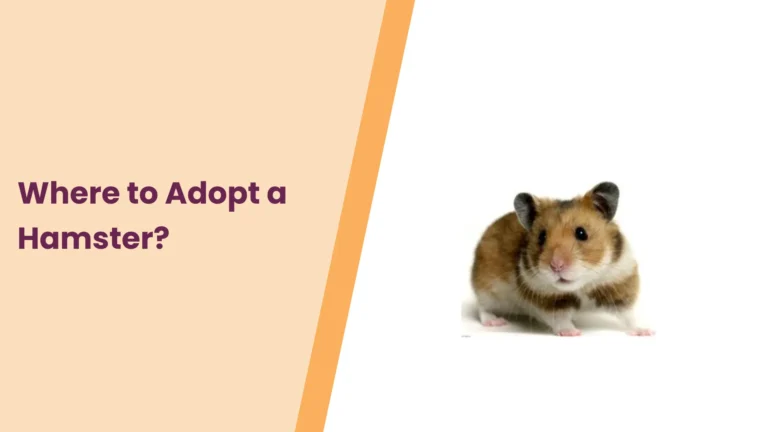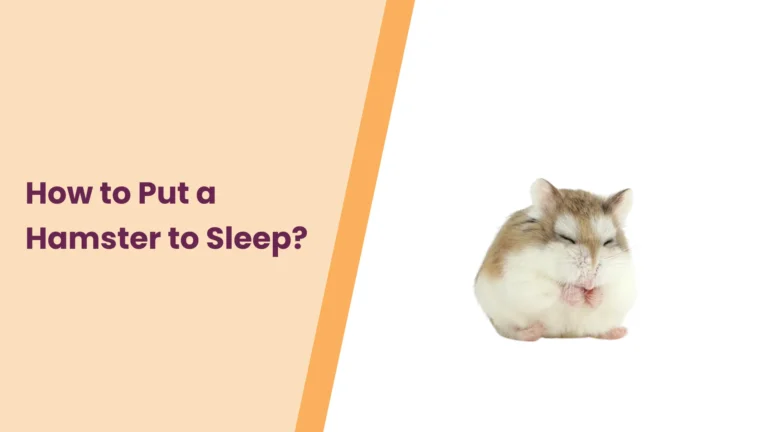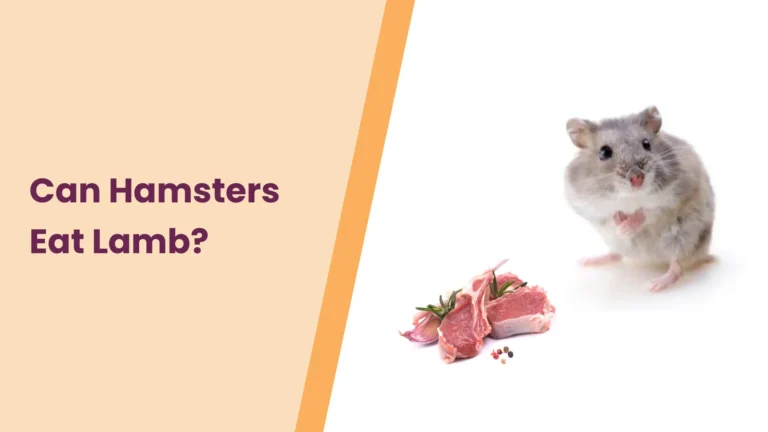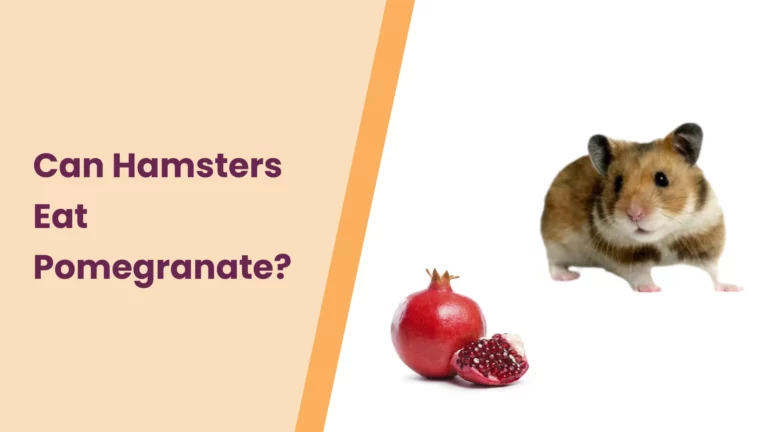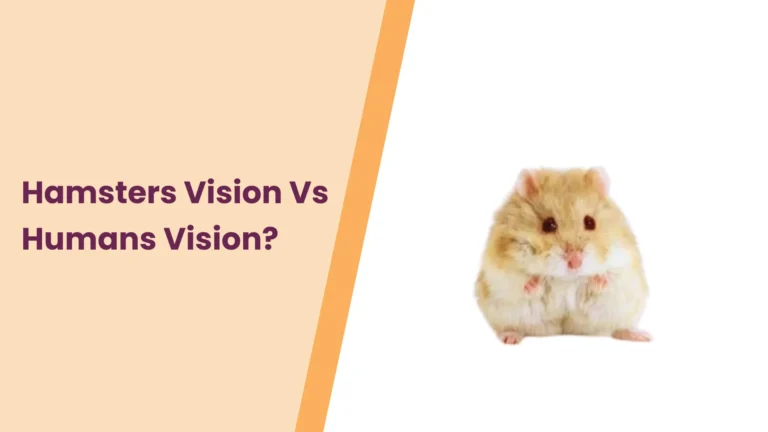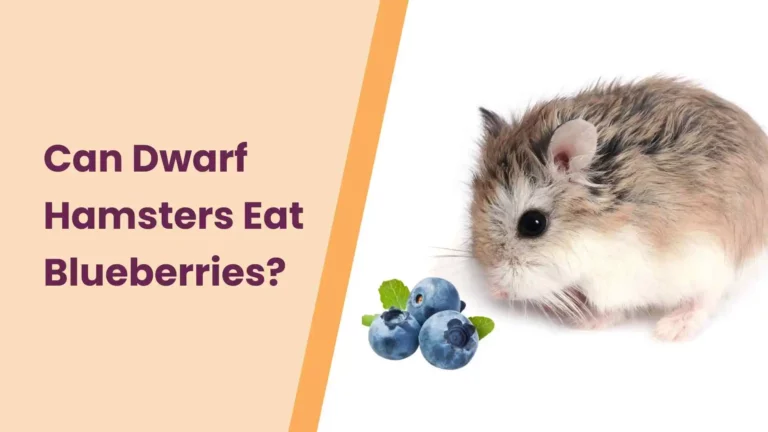Can Hamsters Eat Beetroots? – All You Need To Know
Picture this: you’ve just brought home a tiny, furry hamster, and you want to ensure it has the best care possible. As a responsible pet owner, you’re curious about what your little friend can munch on. One day, you open your fridge and spot a vibrant, crimson beetroot.
You wonder, can hamsters eat beetroots? In this guide, we’re diving deep into the world of hamster nutrition to help you make informed choices for your beloved pet. Discover the ins and outs of offering beetroots as a treat and whether it’s a nutritious addition to their diet.
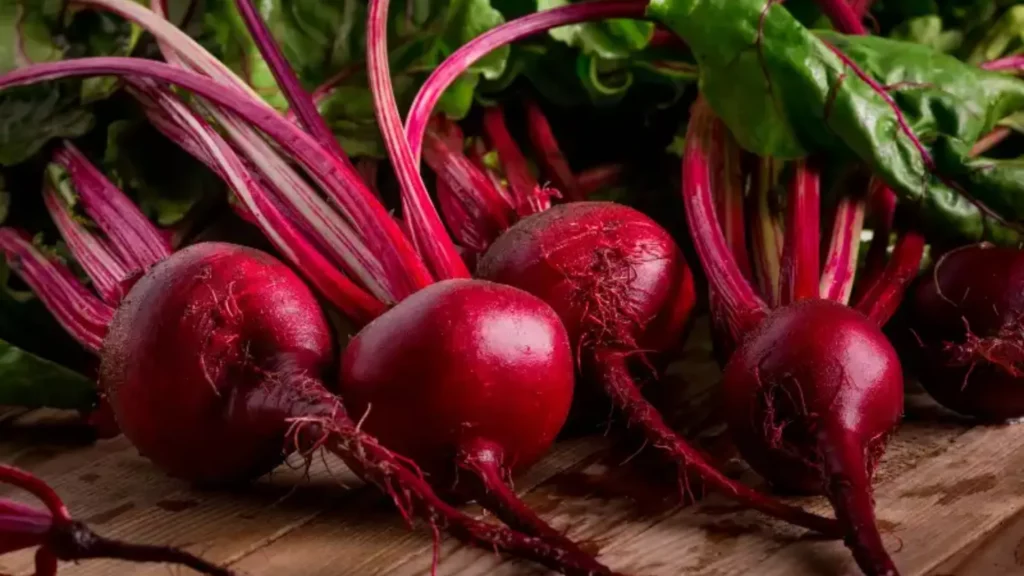
Your hamster’s well-being is our top priority, so let’s explore the beetroot mystery together and ensure your furry companion stays happy and healthy!
Are Beetroots Safe for Hamsters?
When it comes to your furry friend’s diet, safety is paramount. You may be wondering, can hamsters safely enjoy the earthy and sweet delights of beetroots? To answer your question, Yes Beetroot is absolutely safe for your hamster for consuption. Now let’s dive into the details of Beetroot’s constituents!
Nutritional Content of Beetroots
Before we dive into the safety aspect, let’s understand what beetroots bring to the table. These ruby-colored root vegetables are packed with essential nutrients that can offer some advantages to your hamster’s health. Beetroots are a good source of:
Vitamins: They contain vitamin C, which can boost your hamster’s immune system and overall health.
Minerals: Beetroots are rich in minerals like potassium and manganese, which play a vital role in various bodily functions.
Fiber: The fiber content in beetroots can aid in digestion and prevent constipation in hamsters.
Potential Benefits
Including beetroots in your hamster’s diet in moderation can have some potential benefits. The vitamins and minerals can contribute to their overall well-being, and the fiber content can help maintain a healthy digestive system. As with any treat, it’s essential to offer beetroots in small portions to avoid overindulgence.
Risks to Be Aware of
While beetroots have their advantages, there are also potential risks associated with feeding them to your hamster. Beetroots are high in natural sugars, and excessive consumption can lead to weight gain and even diabetes in hamsters. It’s crucial to remember that hamsters are small creatures, and their digestive systems can be sensitive. Overfeeding beetroots or introducing them too quickly into their diet can upset their stomachs.
Key Factors to Consider
When contemplating whether to offer beetroots to your hamster, consider the following key factors:
Moderation: Always provide beetroots as an occasional treat and not a staple in their diet.
Portion Control: A small slice or cube of beetroot is sufficient for one serving.
Observation: Monitor your hamster’s response to beetroots. If you notice any digestive issues or changes in behavior, adjust their diet accordingly.
Beetroots can be a nutritious addition to your hamster’s diet when offered responsibly. As we delve deeper into this topic, we’ll discuss preparation, alternatives, and the best ways to keep your hamster happy and healthy. Remember, your hamster’s well-being is the top priority, and responsible pet care is all about making informed choices.
Nutritional Value of Beetroots
To determine if beetroots are a suitable addition to your hamster’s diet, it’s essential to understand the nutritional riches these vibrant root vegetables offer. Beetroots are a wholesome source of various essential nutrients that, when provided in moderation, can contribute positively to your hamster’s health and well-being.
Vitamins
Beetroots are naturally abundant in vitamins that play a crucial role in supporting your hamster’s overall health. One such vitamin found in beetroots is Vitamin C. This nutrient is well-known for its immune-boosting properties, which can be particularly advantageous for hamsters. A strong immune system helps your furry friend ward off illnesses and stay active and lively.
Minerals
Minerals are another vital component of beetroots that can benefit your hamster. Potassium and manganese are among the prominent minerals in these vegetables. Potassium is essential for maintaining proper fluid balance in your hamster’s body, while manganese aids in various bodily functions, including bone health and nutrient metabolism. These minerals help ensure that your hamster’s body functions optimally.
Fiber
Fiber is an integral part of a hamster’s diet for digestive health. Beetroots provide a good amount of dietary fiber, which is beneficial for maintaining a healthy digestive system in your furry friend. A well-functioning digestive tract helps prevent issues like constipation and ensures that your hamster can efficiently absorb the nutrients from their food.
However, it’s important to emphasize that while beetroots offer these valuable vitamins, minerals, and fiber, they should only be provided in moderation. Hamsters have specific dietary needs, and their small size means that even nutritious treats should be limited to prevent potential health issues.
The key to reaping the benefits of beetroots lies in responsible and controlled feeding. A small slice or cube of beetroot on occasion can serve as a nutritious treat for your hamster without posing any harm. This way, you can introduce variety into their diet while ensuring their nutritional needs are met.
The nutritional value of beetroots, including vitamins, minerals, and fiber, can be a valuable addition to your hamster’s diet if approached with care. By providing these vibrant vegetables in moderation, you can help your hamster thrive with a well-rounded and balanced diet.
Risks of Feeding Beetroots to Hamsters
While beetroots offer valuable nutrients, it’s crucial to be aware of potential risks associated with overindulgence. Hamsters, due to their small size and sensitive digestive systems, can be susceptible to certain health issues if beetroots are not fed responsibly. Let’s explore these risks and understand how to keep your furry companion safe.
Risks of Weight Gain
One of the primary concerns associated with overfeeding beetroots to hamsters is the risk of weight gain. Beetroots contain natural sugars, and excessive consumption can lead to an increase in calorie intake, potentially resulting in your hamster packing on the pounds. Obesity can lead to various health problems, including diabetes and reduced mobility, so it’s crucial to maintain a balanced diet.
Digestive Upset
Another issue that can arise from overindulging in beetroots is digestive upset. Hamsters have sensitive stomachs, and introducing new foods, especially those high in fiber, can sometimes lead to gastrointestinal discomfort. Symptoms may include diarrhea, bloating, and changes in bowel habits. To prevent this, it’s essential to offer beetroots in small, manageable portions.
Guidance on Portion Control
To avoid the aforementioned risks, it’s imperative to exercise portion control when feeding beetroots to your hamster. A small, thin slice or a small cube of beetroot is an adequate portion for one serving. Remember, hamsters are tiny creatures, and a little goes a long way. Be mindful of the size of the treat to prevent excessive calorie intake.
Frequency of Feeding
In addition to portion control, it’s essential to monitor the frequency of feeding beetroots. These should be considered as occasional treats rather than a daily part of their diet. Offering beetroots as a special treat, perhaps once or twice a week, ensures that your hamster enjoys the benefits without compromising their overall health.
As a responsible hamster owner, keeping a watchful eye on your pet’s diet is key. Pay attention to how your hamster reacts to the introduction of beetroots. If you notice any signs of digestive issues or if your hamster’s weight starts to increase, it’s advisable to adjust their diet accordingly.
While beetroots can be a nutritious addition to your hamster’s diet when given in moderation, it’s vital to be aware of the potential risks of overfeeding. By practicing portion control and maintaining a proper feeding frequency, you can provide your hamster with a safe and balanced diet, ensuring their well-being and happiness.
Preparing Beetroots for Hamsters
As you embark on the journey of introducing beetroots to your hamster’s diet, it’s crucial to ensure that the process is not only nutritious but also safe and enjoyable. Let’s explore the best practices for preparing beetroots, including serving size, presentation, and tips on choosing the freshest and safest options for your furry friend.
Slicing and Dicing
Before serving beetroots to your hamster, you’ll want to ensure that they are cut into appropriately sized pieces. A small, thin slice or a small cube is the perfect serving size. These portions are not only manageable for your hamster to consume but also help maintain portion control to prevent overindulgence.
Cooking or Raw?
Beetroots can be served to your hamster either cooked or raw. While some hamsters may prefer raw beetroots, others may find cooked beetroots more appealing due to their softer texture. It’s recommended to experiment with both options to see which one your hamster prefers. Regardless of your choice, always ensure that the beetroots are served in small, hamster-friendly portions.
Presentation Matters
When presenting beetroots to your hamster, consider arranging them in an engaging and interactive way. Hamsters enjoy foraging and exploring, so you can hide small pieces of beetroot in their bedding or inside a puzzle toy to stimulate their natural instincts. This not only provides mental stimulation but also makes mealtime an exciting adventure for your pet.
Choosing Fresh and Safe Beetroots
To guarantee the best quality for your hamster, it’s essential to choose fresh and safe beetroots. Here are some tips to help you make the right selection:
Look for Firmness: Opt for beetroots that are firm to the touch and free from soft spots or wrinkles. Fresh beetroots should feel solid and weighty.
Inspect the Skin: The skin of the beetroot should be smooth, unblemished, and free from mold or discoloration.
Check the Greens: If the beetroots come with their leafy greens attached, ensure that the greens are vibrant and not wilted. While hamsters can enjoy some greens, the beetroot itself is the focus of this treat.
Organic vs. Conventional: Consider choosing organic beetroots when possible to minimize potential exposure to pesticides or chemicals.
Preparing beetroots for your hamster involves ensuring the right serving size, exploring different serving methods, and selecting the freshest and safest beetroots available. Your hamster’s dining experience can be both nutritious and enjoyable, enhancing their overall well-being and happiness.
Alternatives to Beetroots
While beetroots can be a tasty and nutritious treat for your hamster when given in moderation, it’s essential to provide a variety of foods to ensure a balanced and fulfilling diet. Let’s explore some alternative vegetables and treats that can complement your hamster’s meals, all while focusing on the importance of balance.
Carrots
Carrots are a favorite among many hamsters. These crunchy vegetables are not only delicious but also packed with vitamins and fiber. Carrots can be served in small, manageable slices or grated for a different texture. Remember to offer them in moderation due to their sugar content.
Cucumber
Cucumber slices are hydrating and low in calories, making them a refreshing and healthy option. Hamsters enjoy the crispness of cucumber, and it’s an excellent choice for a cooling treat during warm days.
Broccoli
Broccoli florets are a great source of essential vitamins and minerals for your hamster. They also offer some variety in terms of texture and flavor, which can be stimulating for your pet. Ensure that the broccoli pieces are small and easy to handle.
Small Portions of Fruit
In addition to vegetables, you can occasionally offer small portions of hamster-safe fruits, such as apple slices or a small piece of banana. These fruits provide natural sugars and additional nutrients that your hamster may find delightful. Again, moderation is key due to the sugar content.
Commercial Hamsters Treats
There are various commercially available hamster treats that are specially formulated to meet their dietary needs. These treats are often designed to be nutritionally balanced and can add a level of convenience to your hamster’s diet. Always check the ingredients to ensure they are suitable for your pet.
Importance of a Balanced Diet
While offering a variety of treats is essential to keep your hamster’s meals exciting, it’s equally crucial to maintain a balanced diet. Hamsters have specific dietary requirements, including a mix of fresh vegetables, high-quality hamster pellets, and access to fresh water. Ensuring that their diet is well-rounded is the key to keeping them healthy and happy.
Remember that moderation is the golden rule when it comes to treats, including beetroots and alternatives. Overindulgence in any specific treat can lead to nutritional imbalances and potential health issues. Always monitor your hamster’s response to new foods and adjust their diet accordingly.
While beetroots can be a delightful addition to your hamster’s diet, offering a range of alternatives ensures that your pet receives a diverse and balanced nutrition. By keeping their meals interesting and well-rounded, you contribute to their overall health and well-being.
Conclusion
In the world of hamster care, the question of “Can Hamsters Eat Beetroots?” has been unveiled. The answer? Yes, they can enjoy this vibrant treat when offered in moderation. Beetroots bring a dash of color and nutrition to your furry friend’s diet, with their rich array of vitamins, minerals, and fiber.
But the journey doesn’t end with beetroots alone. The key to pampering your hamster lies in a balanced and diverse diet. Consider the array of alternatives, from crisp carrots to hydrating cucumbers, all designed to delight your pet’s taste buds while keeping them in the pink of health.
Our focus here is the well-being of your treasured hamster, and that means embracing variety and moderation. As responsible pet owners, we have the power to keep our little companions happy, healthy, and thriving.
So, embark on this exciting culinary adventure with your hamster, explore the world of treats, and savor the joy of watching your pet relish every morsel. Your hamster’s contentment is the ultimate reward for your thoughtful care.
In the spirit of happy hamsters and responsible pet ownership, we encourage you to dive deeper into the delightful world of hamster nutrition. Your hamster’s journey is just beginning, and there’s so much to discover.
“Your thoughts and experiences matter to us, and we’d love to hear from you. Have you ever treated your hamster to some tasty beetroots or other delectable treats? Feel free to share your stories, insights, or any questions you might have in the comments section below.
Your contributions not only enrich our community but also provide valuable information to fellow hamster enthusiasts. If you found this information helpful, don’t hesitate to share it with your friends, family, or fellow pet lovers on social media or other platforms.
Together, we can create a supportive network of hamster lovers who are dedicated to providing the best possible care for these adorable pets. Thank you for being a part of our hamster care community!” – Hamsterpit.

